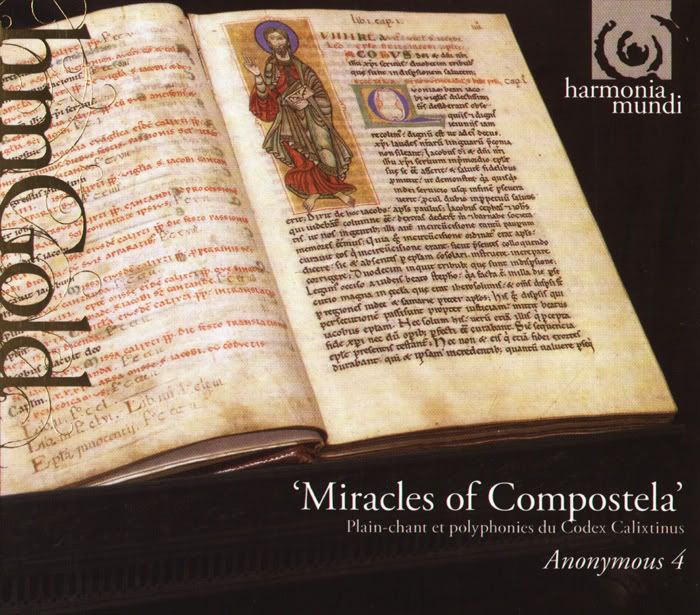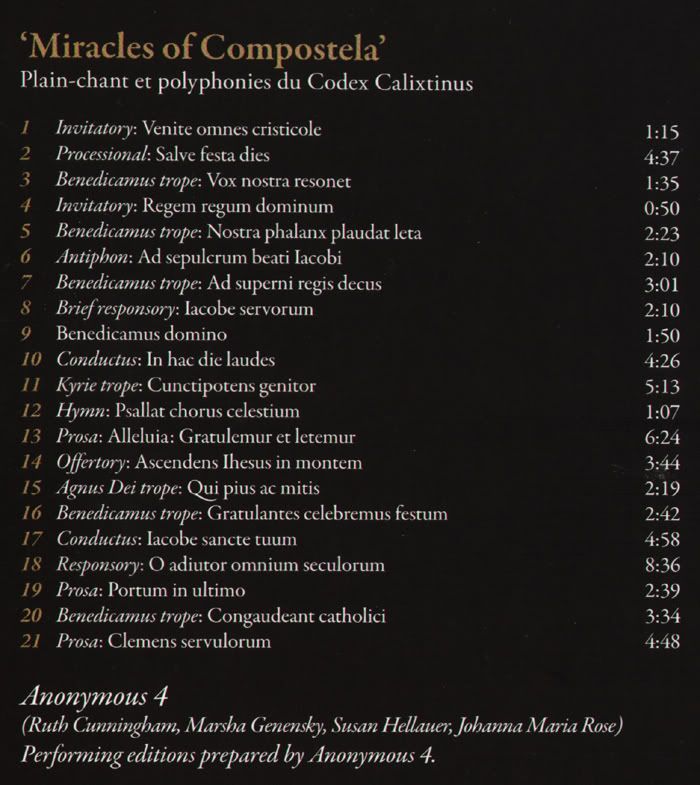Pro Member
Group: Members
Posts: 695
Warn:0%
|
 |
| Артист: |
Anonymous 4 |
| Альбом: |
Anonymous 4 - Miracles of Compostela, 2008 |
| Издатель: |
Harmonia Mundi / HMG 507156 |
| Жанр: |
Classical |
| Формат файла: |
EAC / FLAC / CUE / LOG |
| Ссылка: |
CD |
| Нахождение: |
Torrent |
|
Miracles of CompostelaMedieval Chant & Polyphony for St. James from the Codex CalixtinusLabel: Harmonia Mundi, HMG507156 Year: 2008 Performer:Anonymous 4 The Codex Calixtinus, a document housed at the Cathedral of Santiago de Compostela, includes an odd assortment of writings relating to St. James the Greater -- sermons, lessons, miracle stories, guides to medieval pilgrimage routes, grammatical exercises for schools boys, and a wealth of chant, as well as some of the earliest examples of two- and three-part vocal polyphony. On this 1995 recording the a cappella women's quartet Anonymous 4 sings 21 intriguingly diverse selections from the collection, ranging from simple monophonic chant to astonishingly dissonant polyphony. The textural variety is one of the album's greatest charms; even within the same piece, the texture can beguilingly shift from one to three voices (since many of the chants and two-voice pieces use drones). The two-part responsory, "Portum in ultimo," sung over a drone, is particularly haunting. Other pieces are so melodically eccentric and memorable that they should dispel any stereotypes about medieval music being boring and predictable, particularly the two Benedicamus tropes "Ad superni regis decus" and "Gratulantes celebremus festum." Anonymous 4 sings with its customary blend of purity and expressiveness, with warmth and immaculate intonation, and it's a performance of great serenity. Harmonia Mundi's sound is ideally warm, clean, and resonant.Since the late twelfth century, the Cathedral of Santiago in Compostela has possessed a manuscript entitled Jacobus (or Codex Calixtinus). How it found its way to Compostela is not known for certain, but it is undoubtedly a French product, probably compiled or written in Cluny around 1150. Although they represent a mere ten percent of the music in Jacobus, the polyphonic works have received attention from scholars because they are among the earliest such pieces to have been written down. But the notation in Jacobus is ambiguous as to rhythm and meter, as well as to alignment of pitches between the voice parts in the polyphony... Tracklist:01. Venite omnes cristicole 02. Salve festa dies 03. Vox nostra resonet 04. Regem regum Dominum - Venite exsultemus 05. Nostra phalanx plaudat leta 06. Ad sepulcrum beati Iacobi 07. Ad superni regis decus 08. Iacobe servorum 09. Benedicamus Domino 10. In hac die laudes 11. Conctipotens genitor 12. Psallat chorus celestium 13. Alleluia Gratulemur et letemur 14. Ascendens Ihesus in montem 15. Qui pius ac mitis 16. Gratulantes celebremus festum 17. Iacobe sancte tuum 18. O adiutor omnium seculorum 19. Partum in ultimo 20. Congaudeant catholici 21. Clemens servulorum gemitus tuorum   LOG LOG| SPOILER! | EAC extraction logfile from 3. July 2008, 10:17 for CD
Anonymous 4 / Miracles of Compostela
Used drive : HL-DT-STDVDRAM GSA-H62N Adapter: 2 ID: 1
Read mode : Secure with NO C2, accurate stream, disable cache
Read offset correction : 667
Overread into Lead-In and Lead-Out : No
Used output format : C:\Program Files\FLAC\flac.exe (User Defined Encoder)
320 kBit/s
Additional command line options : -8 -V -T "ARTIST=%a" -T "TITLE=%t" -T "ALBUM=%g" -T "DATE=%y" -T "TRACKNUMBER=%n" -T "GENRE=%m" -T "COMMENT=EAC FLAC -8" %s
Other options :
Fill up missing offset samples with silence : Yes
Delete leading and trailing silent blocks : No
Native Win32 interface for Win NT & 2000
Track 1
Filename E:\X\Anonymous 4 - Miracles of Compostela (2008) [FLAC]\01 - Invitatory - Venite omnes cristicole.wav
Pre-gap length 0:00:02.00
Peak level 59.6 %
Track quality 100.0 %
Test CRC 990E4A16
Copy CRC 990E4A16
Copy OK
Track 2
Filename E:\X\Anonymous 4 - Miracles of Compostela (2008) [FLAC]\02 - Processional - Salve festa dies.wav
Peak level 66.3 %
Track quality 99.9 %
Test CRC 5353D170
Copy CRC 5353D170
Copy OK
Track 3
Filename E:\X\Anonymous 4 - Miracles of Compostela (2008) [FLAC]\03 - Benedicamus trope - Vox nostra resonet.wav
Peak level 87.0 %
Track quality 100.0 %
Test CRC A5D0FE49
Copy CRC A5D0FE49
Copy OK
Track 4
Filename E:\X\Anonymous 4 - Miracles of Compostela (2008) [FLAC]\04 - Invitatory - Regem regum dominum.wav
Pre-gap length 0:00:04.92
Peak level 28.1 %
Track quality 100.0 %
Test CRC BCFED00A
Copy CRC BCFED00A
Copy OK
Track 5
Filename E:\X\Anonymous 4 - Miracles of Compostela (2008) [FLAC]\05 - Benedicamus trope - Nostra phalanx plaudat leta.wav
Peak level 45.3 %
Track quality 100.0 %
Test CRC A41A9B68
Copy CRC A41A9B68
Copy OK
Track 6
Filename E:\X\Anonymous 4 - Miracles of Compostela (2008) [FLAC]\06 - Antiphon - Ad sepulcrum beati Iacobi.wav
Pre-gap length 0:00:02.96
Peak level 66.2 %
Track quality 100.0 %
Test CRC C9B53AA2
Copy CRC C9B53AA2
Copy OK
Track 7
Filename E:\X\Anonymous 4 - Miracles of Compostela (2008) [FLAC]\07 - Benedicamus trope - Ad superni regis decus.wav
Pre-gap length 0:00:02.41
Peak level 79.2 %
Track quality 100.0 %
Test CRC 93589641
Copy CRC 93589641
Copy OK
Track 8
Filename E:\X\Anonymous 4 - Miracles of Compostela (2008) [FLAC]\08 - Brief responsory - Iacobe servorum.wav
Pre-gap length 0:00:02.97
Peak level 45.6 %
Track quality 100.0 %
Test CRC 049D00E3
Copy CRC 049D00E3
Copy OK
Track 9
Filename E:\X\Anonymous 4 - Miracles of Compostela (2008) [FLAC]\09 - Benedicamus domino.wav
Pre-gap length 0:00:02.42
Peak level 64.9 %
Track quality 100.0 %
Test CRC 33F8CD41
Copy CRC 33F8CD41
Copy OK
Track 10
Filename E:\X\Anonymous 4 - Miracles of Compostela (2008) [FLAC]\10 - Conductus - In hac die laudes.wav
Pre-gap length 0:00:02.81
Peak level 37.6 %
Track quality 100.0 %
Test CRC 8A75AD17
Copy CRC 8A75AD17
Copy OK
Track 11
Filename E:\X\Anonymous 4 - Miracles of Compostela (2008) [FLAC]\11 - Kyrie trope - Cunctipotens genitor.wav
Pre-gap length 0:00:02.53
Peak level 64.3 %
Track quality 100.0 %
Test CRC B6776ED4
Copy CRC B6776ED4
Copy OK
Track 12
Filename E:\X\Anonymous 4 - Miracles of Compostela (2008) [FLAC]\12 - Hymn - Psallat chorus celestium.wav
Peak level 70.5 %
Track quality 100.0 %
Test CRC 99821088
Copy CRC 99821088
Copy OK
Track 13
Filename E:\X\Anonymous 4 - Miracles of Compostela (2008) [FLAC]\13 - Prosa-Alleluia - Gratulemur et letemur.wav
Pre-gap length 0:00:02.73
Peak level 45.5 %
Track quality 100.0 %
Test CRC FAEAD1FC
Copy CRC FAEAD1FC
Copy OK
Track 14
Filename E:\X\Anonymous 4 - Miracles of Compostela (2008) [FLAC]\14 - Offertory - Ascendens Ihesus in montem.wav
Pre-gap length 0:00:02.64
Peak level 92.9 %
Track quality 100.0 %
Test CRC 7BADE44E
Copy CRC 7BADE44E
Copy OK
Track 15
Filename E:\X\Anonymous 4 - Miracles of Compostela (2008) [FLAC]\15 - Agnus dei trope - Qui pius ac mitis.wav
Pre-gap length 0:00:03.18
Peak level 46.1 %
Track quality 100.0 %
Test CRC 86729441
Copy CRC 86729441
Copy OK
Track 16
Filename E:\X\Anonymous 4 - Miracles of Compostela (2008) [FLAC]\16 - Benedicamus trope - Gratulantes celebremus festum.wav
Pre-gap length 0:00:05.14
Peak level 51.6 %
Track quality 100.0 %
Test CRC 4A566672
Copy CRC 4A566672
Copy OK
Track 17
Filename E:\X\Anonymous 4 - Miracles of Compostela (2008) [FLAC]\17 - Conductus - Iacobe sancte tuum.wav
Pre-gap length 0:00:04.61
Peak level 76.5 %
Track quality 100.0 %
Test CRC 4F115BBD
Copy CRC 4F115BBD
Copy OK
Track 18
Filename E:\X\Anonymous 4 - Miracles of Compostela (2008) [FLAC]\18 - Responsory - O adiutor omnium seculorum.wav
Pre-gap length 0:00:02.41
Peak level 99.4 %
Track quality 100.0 %
Test CRC 29F0698E
Copy CRC 29F0698E
Copy OK
Track 19
Filename E:\X\Anonymous 4 - Miracles of Compostela (2008) [FLAC]\19 - Prosa - Portum in ultimo.wav
Peak level 36.4 %
Track quality 100.0 %
Test CRC D6BE1826
Copy CRC D6BE1826
Copy OK
Track 20
Filename E:\X\Anonymous 4 - Miracles of Compostela (2008) [FLAC]\20 - Benedicamus trope - Congaudeant catholici.wav
Pre-gap length 0:00:03.13
Peak level 67.4 %
Track quality 100.0 %
Test CRC 2E7FD54A
Copy CRC 2E7FD54A
Copy OK
Track 21
Filename E:\X\Anonymous 4 - Miracles of Compostela (2008) [FLAC]\21 - Prosa - Clemens servulorum.wav
Pre-gap length 0:00:03.20
Peak level 58.2 %
Track quality 100.0 %
Test CRC 4380B58D
Copy CRC 4380B58D
Copy OK
No errors occured
End of status report |
This post has been edited by kgkk on 23-08-2008, 21:56 |

 Help
Help
 Search
Search
 Members
Members
 Gallery
Gallery
 Calendar
Calendar





